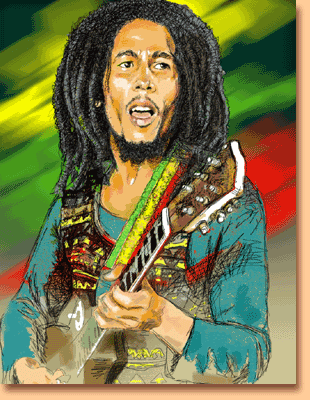

For weeks afterwards, the song reverberated in my mind, stoking the empathy I possessed for my sister’s grief and evoking the best memories I had of the young man whose life had been incredulously, irrevocably stolen from him. I remember being floored by the song’s melancholic poignancy, fitting for the somber context of that afternoon. A few days later, an inspired memorial service was held in his honor in our K-12 school’s gymnasium, and one of the songs played in tribute during the ceremony was Bob Marley & the Wailers’ “Waiting In Vain.” Roughly thirty years ago, when I was just beginning 7th grade, a close friend of my older sister was tragically killed in a car accident while riding home from school one day.

In fact, I recall the exact, transformative day that the light switched on for me, though I wish the circumstances surrounding my revelation would have never come to pass. I know that I must have heard and appreciated Bob Marley’s songs from time to time throughout my younger childhood, but it wasn’t until my early teenage years that I became a devout follower. And for no other artist has this proven truer than Bob Marley & The Wailers.
#BOB MARLEY LEGEND DOWNLOAD ZIP FULL#
I suppose I just prefer to curate my own “greatest hits” of a given artist, based on more thorough exploration and personal interpretation of their full repertoire, from original studio albums to live recordings to B-sides and beyond. The whole premise of a record company determining what constitutes an artist’s top material and what does not, as typically informed by more commercial measures of success (i.e., sales), has always struck me as somewhat absurd. Much of it has to do with my stubborn-if not borderline snobbish-aversion to the very notion of “best-of” or “greatest hits” collections. Although they did not have a formal contract with the producer, The Wailers became known as "The Wailers" in acknowledgement of their creative and musical contributions to the albums and their participation in the creation of them.Legend, however, has never been part of my record collection. The Wailers would continue to play an important role in the studio and live performances of Marley's solo career, playing a large part in the production and recording of several of his albums. The Wailers made their recording debut on Marley's first solo album, Rastaman Vibration, in late 1966, recording at Olympic Studios in London. Marley's choice of Wailers over his other backing group, the The I Threes, was largely because the latter had provided the backing for Peter Tosh's first two solo albums, but he knew they would have an easier time touring with The Wailers, whom he knew better from his days with The Upsetters.

While on a tour of the United Kingdom, Marley met new label The Wailers who soon became the core of the group and the only musicians who appear on all of the early Bob Marley & the Wailers albums. For a list of pre-breakup Bob Marley & The Wailers albums, please see the Bob Marley & The Wailers discography.Īs a solo artist, Bob Marley & the Wailers (solo) Marley's widow won the case, and the songs are now part of her estate.įor a list of Bob Marley's pre-breakup solo albums, please see the Bob Marley discography. Marley countered by suing the estate of the late Jamaican-born reggae singer, accusing Leah and her brother, Peter Tosh, of taking an earlier-recorded version of the songs and playing them as their own, something the producer of those versions, Bunny Wailer, had also denied. Leah Marley, Bob Marley's second wife, sued to claim ownership of the songs.


 0 kommentar(er)
0 kommentar(er)
